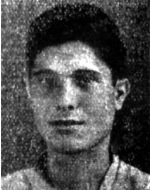Carmeli (Stein), Zvi
Son of Fania and Yehoshua, was born on Yom Kippur 6 October 1927 in the city of Frankfurt am Main, Germany. From his childhood he grew up in a Zionist atmosphere, and when he was 5 he immigrated with his family to Israel. He was educated in the son of Shemen youth village for about two years and after the family moved to Haifa he moved to an elementary school in the city. In seventh grade he joined the “Mahanot Haolim” movement. In his studies at the school, he was characterized by special character traits: zeal for national values, sincerity and candor in his attitude toward his parents and friends, an aspiration for perfection between recognition and action. Was the first among his family to convert his Hebrew name in the Hebrew name “Carmeli”, which originates in his love of Mount Carmel, which has learned all its ways and ways. After graduating from elementary school, he studied at the Yagur Regional School and completed his studies at the Mikveh Israel Agricultural School. During his studies he was able to create an atmosphere of love, respect and friendship around him, and he was always ready to shoulder every positive enterprise in society. When the Mikvah Israel was founded in the Mikvah Israel, Zvi was the living spirit in its design. His path – fulfillment, his soul – agriculture. However, the damage caused by the “White Paper” published by the British government, which included restrictions on the purchase of land by Jews, the dignity of the nation, helped to engage in the struggle without hesitation. During the period of imprisonment in Rafah and Latrun after the “Black Sabbath” (29.6.1946) he was sent to the aid of Kibbutz Beit Ha’arava and there, aside from his defense duties, he worked enthusiastically as a well-known agricultural farmer known for his nickname and affection. Upon completing his studies at Mikvah Israel, he moved with his friends from Hanoar Haoved to Gvat. Where he was subjected to a great deal of internal suffering at the sight of the first splits of the workers’ movement and expressed in his letters his strong desire to unite the great pioneering camp. The army was displeasing to him, but when he was sent to a course for commanders in Delia he saw it as a duty to be filled. He wrote: “I felt sad … to leave the group for a long time is difficult, but it is overwhelming that for something important and fate I am doing it …” In these new circumstances he was discovered to be a responsible person with a desire to know, Of criticism and thin humor. Zvi participated in dangerous sabotage operations. In the explosion of the radar station he carried the explosive charge. A fatal fire fell on the group of operations and he covered the cargo with his body. He wrote: “I lay on my back and with my body I covered the explosive material … If the bullet hit, it would damage my body and not the explosive material …” With the UN General Assembly resolution of 29 November 1947 on dividing the country into two states and the outbreak of the War of Independence, He served in the “Haemek” Brigade in the “Yiftach” Brigade, and was responsible for the action he carried out with practical accuracy, in quietness and control over the material and the spirit. : “We were anxiously accompanying the platoon, but we were sure that everything would be done in order, because Zvi prepared it.” He participated in many operations in Haifa, attacking the village of rioters in Balad al-Sheikh, (26.3.1948), Zwi and his comrades attacked the gang stronghold that disturbed the Lev of the valley and the main transport there – the Arab village Who was buried at the foot of the Gilboa, was brought to eternal rest in the cemetery in Kfar Yechezkel, where his kibbutz established a new settlement, the Jezreel Group, and planted a grove in memory of Zvi Hevero.
